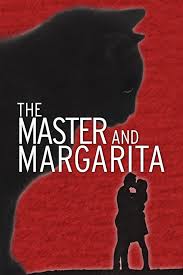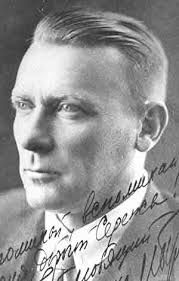 It’s been a ragged week of theater-going, as I continue to dig BABEL sand out from between my toes. Probably I had too much on my plate. The plan was to go see Tom Stoppard’s Arcadia on Wed night at Yale Rep, then to see Toneelgroep’s 5+ hour Angels in America at BAM on Friday, and cap it off with the Yale Drama School’s Master and Margarita last night in New Haven. Struggling with sleep debt and a sick child, I ended up batting about .500: we left Arcadia after the first act, despite liking it very much. I pulled the plug entirely on the late night in Brooklyn on Fri & cooked family dinner at home instead. But last night’s Master and Margarita in New Haven was utterly brilliant: the best play I’ve ever seen by Yale Drama School students in two decades (!) of seeing their productions. I wasn’t sure how Bulgakov’s sprawling, chaotic novel could work on stage — but it did, and I’m still reeling from it. Genius is a powerful thing!
It’s been a ragged week of theater-going, as I continue to dig BABEL sand out from between my toes. Probably I had too much on my plate. The plan was to go see Tom Stoppard’s Arcadia on Wed night at Yale Rep, then to see Toneelgroep’s 5+ hour Angels in America at BAM on Friday, and cap it off with the Yale Drama School’s Master and Margarita last night in New Haven. Struggling with sleep debt and a sick child, I ended up batting about .500: we left Arcadia after the first act, despite liking it very much. I pulled the plug entirely on the late night in Brooklyn on Fri & cooked family dinner at home instead. But last night’s Master and Margarita in New Haven was utterly brilliant: the best play I’ve ever seen by Yale Drama School students in two decades (!) of seeing their productions. I wasn’t sure how Bulgakov’s sprawling, chaotic novel could work on stage — but it did, and I’m still reeling from it. Genius is a powerful thing!
I’ll take the three plays very quickly in order, though the last was the best.
Stoppard’s Arcadia was very well-done at Yale Rep, at least in the half I saw. Stoppard has a wonderful ability as a playwright to capture the excitement and irregular progress of thinking. This play, set partly in the Romantic era and partly in the 1980s on the same English estate, moves mostly through conversation — but it’s gorgeous conversation. I now wish that we’d stuck in out until the last scene, when the doomed tutor Septimus, who would become the mysterious Hermit of Sidley Park shortly after the play’s early-period events, and his doomed student Thomasina, who dies in a fire just before her 17th birthday, enjoyed a halting dance.
I’m very sorry I missed Toneelgroep’s Angels, but I just couldn’t manage the long night in Brooklyn on Friday. Olivia’s been home for a couple days with a bad sinus infection, and I needed to get home Friday.
I’m very glad, however, that we didn’t let our general exhaustion or Ian’s far-away soccer game Sat afternoon keep us away from the Yale Drama School’s amazing production of The Master and Margarita. As the only review I could find, in a local online site called the New Haven Review puns, the show was masterful in all ways: acting, staging, setting, costumes, lighting. A thoroughly professional and joyously entertaining evening. There was no way we were going home at the interval this time!
Watching the play bring Bulgakov’s massive novel, arguably the great triumph of early twentieth-century Russian literature, to the stage was dizzying. The novel is a rollicking comic satire, in which an urbane devil, named Woland but he also answers to Satan, comes to Moscow to perform a magic show and stage a Satanic Spring Ball. Woland’s entourage, which includes a giant cat-demon named Behemoth, played with fantastic cat-mannerisms by Zenzi Williams, crosses paths with Bulgakov’s semi-autobiographical Master, a writer struggling with the Soviet system and with his play about Pontius Pilate and Yeshua (Jesus). Woland seemsultimately more interested in Margarita, the Master’s lover, who in order to save her beloved and redeem the play that the Master burns in a fit of rage, becomes a naked witch, and hosts the Devil’s Ball.
“Manuscripts don’t burn,” croons Woland, thereby restoring the Master’s burnt playscript and providing twentieth-century Russia with its most enduring literary phrase. The play like the novel celebrates the persistance of art, the joys and recklessness of creativity amid sorrow and oppression.
But the heart of the show for me was the Master’s painful and gorgeous portrait of Pilate, played by James Cusati-Moyer, as a man who recognizes Yeshua for what he is, knows that his political position in the Empire won’t allow him to spare the prophet, and with great reluctance condemns Yeshua to die. Pilate’s knowing cowardice, his refusal to sacrifice himself for justice in an unjust world, occupies the moral heart of the story. The Master’s cowardly burning of his rejected manuscript parallel’s Pilate’s choice. Pilate is, as the bad poet-turned-witness Ivan notes towards the play’s end, the Master’s “hero.” He gets rewarded the same way the Master does, with an ambiguous reunion after death with the beloved.
The figures who never sacrifice their principles and who smilingly accept whatever fate provides, Margarita in the Moscow plot and Yeshua in Judea, remain slightly opaque and inhuman. When Margarita, played by Ariana Venturi, becomes a witch and Satan’s consort, she performs several scenes entirely nude, as if no longer bound by human customs. The Master’s journey to Margarita parallels Pilate’s to Yeshua: both meet after death a person who has become a supernatural principle.
But the heart of the play (and novel) lies in the world, in Patriarch’s Park and in several Moscow apartments that become lairs for the Devil and his theatrical following. Woland dissects the hypocrisy of Soviet society. His strange alliance with Margarita represents corruption, compromise, and sacrifice, but also art.
Mick Jagger was apparently thinking of Bulgakov when he wrote the song, “Sympathy for the Devil” in 1968, soon after Bulgakov’s novel first appeared in English. This production in New Haven hit me with the force that rock’n’roll imagines itself to have.
What if Pilate is the central figure in the story? What can the procurator do when faced with the prophet but confined by the world?
The final scene of both play and novel relates that supernatural visions have faded from Moscow, surviving only in the full-moon dreams of the writer Ivan, who has been confined for madness. Once a month he sees Margarita emerge from the moon:
And then the moon bursts into frenzy, it tumbles streams of light upon Ivan, it splashes light in all directions, a moon-flood fills the room, the light sways, rises, washes over the bed. And it is then that Ivan Nikolayvich sleeps with a blissful face.
A moon-flood: that word on the final page of Bulgakov’s novel is as good a way as any to describe this wonderful show, adapted by Edward Kemp and directed by Sara Holdren. I wish the short run were not over so that you could all go see it!

[…] experimental theater, and I’ve seen at least one brilliant staging of a Russian masterwork (Bulgakov’s Master and Margarita, also at Yale Rep in 2014). Maybe this show will struggle into coherence in […]